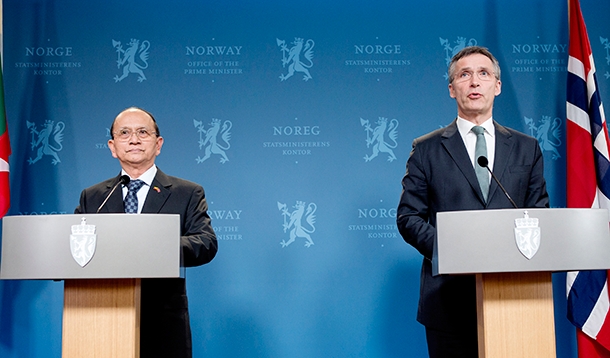CHIANG MAI — The Myanmar Peace Support Initiative (MPSI), a Norwegian government-backed project to mobilize international support for Burma’s peace process, will continue despite criticism and the fact that it was originally set up as a short-term initiative, according to a consultant for the project.
“We are currently discussing with the Norwegian Ministry of Foreign Affairs how to go forward with MPSI,” said Ashley South, who acts as a senior advisor to the project. “For the time being, we have agreed to continue working until at least September.”
Established in early 2012 in response to a request from President Thein Sein, the MPSI has come under fire for its lack of a coherent strategy and its failure to address the concerns of community-based groups and other actors affected by the peace process.
In January of this year, the relevance of the MPSI was reviewed two years after Norway spent US$2 million in Burma’s ethnic conflict areas.
The money was spent on dozens of pilot projects in Shan, Karen, Karenni, Mon, Chin states as well as Pegu and Tenasserim divisions. The projects focused on humanitarian aid, education support, development and the possible return of internally displaced people (IDPs) and refugees. Some 60,000 IDPs were issued national identity card with the support of MPSI, which also held consultations and workshops in ethnic areas.
In March, a report assessing the MPSI noted shortcomings in the way the project was being implemented, but suggested that these issues were being addressed.
“As the peace process slowly moved forward, MPSI recognized the need to become involved in longer-term support, including state-level consultations, building the capacity of ethnic actors to engage with the peace process, and finding ways to make voices from the ground heard by those in power—both the Burmese government or donors,” said the report, titled “Testing Ceasefires, Building Trust.”
However, some relief groups and others dealing with conflict-related issues expressed dissatisfaction with the report’s sanguine assessment of the effectiveness of the MPSI.
“These people [the MPSI] have done nothing for our people,” said Sumlut Seng, an aid worker in Kachin State, where nearly three years of conflict between government forces and ethnic rebels have displaced tens of thousands of civilians.
“[They] just take all this international funds without doing anything to stop the war in our homeland. They should give us the money for IDPs in Kachin State instead,” he added.
South acknowledged that the MPSI was not intended to be a long-term project, but defended the decision to keep it going.
“As the peace process has moved forward, we have felt it useful to keep going and have now been working for nearly two and a half years,” he said via email.

















